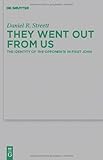 The International Meeting of the Society of Biblical Literature is in Vienna this year. I couldn’t pass up the chance to combine a visit to this world-class city with participation in a world-class biblical studies conference, so I’m excited to announce that I will be presenting two papers:
The International Meeting of the Society of Biblical Literature is in Vienna this year. I couldn’t pass up the chance to combine a visit to this world-class city with participation in a world-class biblical studies conference, so I’m excited to announce that I will be presenting two papers:
1) In the Hellenistic Judaism section, Philo, Festivals, and Participation in the Divine in Hellenistic Judaism. Here’s the abstract:
Festivals were commonly viewed in the ancient Mediterranean as an opportunity for humans to participate in the life of the gods, who are perpetually feasting. Thus Plato (Laws 653d) says that festivals are a gift from the gods, allowing humans “to be made whole again” by “participating in the festivals alongside the gods” (suneortazein en tais eortais meta theōn). The concept of divine mimesis is used to explain the banqueting, liturgy, leisure, and reenactment of divine exploits that accompanied festivals in the Hellenistic world.
In this paper, I examine Philo’s interpretation of the Jewish festivals in light of this tradition. Special attention is paid to: a) the ways in which Philo attempts to distance Jewish feasting from Greek feasting by characterizing the former as askesis, b) Philo’s use of rewritten bible traditions in his descriptions of the festivals, c) Philo’s numerological understanding of the festal calendar, especially in relation to other Hellenistic numerological thought, and d) the possible relationship between Philo and apocalyptic traditions (such as Jubilees) in which Israel’s festivals are depicted as having a heavenly pre-existence, so that Israel’s festival observance is understood as imitatio angelorum.
2) In the Catholic Epistles section, I will be presenting on False Prophets, Sons of Belial, and Sins unto Death: First John’s Reading of Deuteronomy 13 as Eschatological Halakha.
Because 1 John never directly quotes the Old Testament, it is often asserted that letter offers no real insight into the way that early followers of Jesus read their Scriptures. More recently, however, scholars (e.g. J. Lieu) have questioned this consensus by pointing to the extensive use of OT concepts, images, and symbols. In this paper, I supplement this challenge by proposing Deuteronomy 13 as the key subtext for the letter’s treatment of community opponents. Deuteronomy 13 describes “sons of belial” who go out to deceive their fellow Israelites by enticing them to transgress the covenant through idolatry. The text commands that such false prophets be put to death without mercy. I argue that 1 John 2:18–24 and 4:1–6—the key opponent passages—apply this OT text eschatologically in order to shape the community’s own response to the secessionist crisis. Special attention is paid to a) elements in the text of Deut 13 which may have suggested an eschatological understanding of the text, b) the relationship between the Deuteronomic subtext and the puzzling and abrupt injunction against idolatry which concludes the epistle (1 John 5:21), and c) the way that Deuteronomy 13 may inform our understanding of a classic exegetical crux, namely the “sin unto death” (1 John 5:16–17).
If you’re planning to be in Vienna this year, drop me a line and let’s grab a cup of coffee and some Apfelstrudel!




